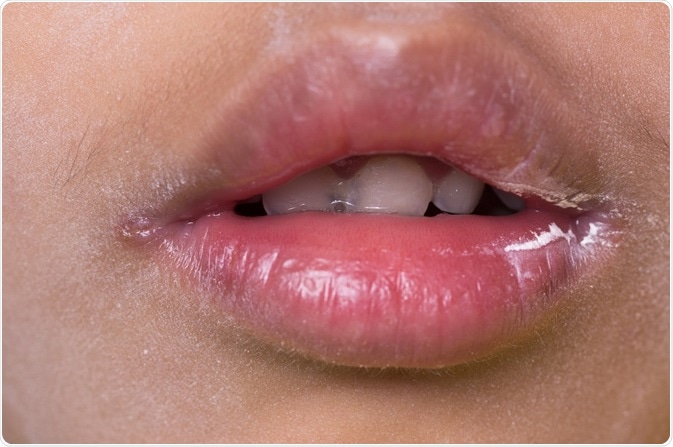Cheilitis is a term describing lip inflammation of various etiologies, which occurs relatively often. The disease may appear as an isolated condition or as part of certain systemic diseases or conditions. It may be part of a clinical picture or an accompanying condition. Cheilitis can co-occur with many conditions including anemia, oral candidiasis, atopy, contact reaction to an irritant or allergen (e.g., to cosmetics), drug intake (e.g., retinoids).
Cheilitis is generally an inflammation that occurs on the vermillion border of the lips. Exfoliative Cheilitis is a chronic disease that occurs locally only on the vermillion border of the lips, which until now the exact cause has not been identified. Exfoliative cheilitis often has clinical symptoms similar to other diseases, one of which is Factitial Cheilitis. Factitial Cheilitis often occurs in adolescent to adult women. Many factors are closely related to the disease, such as psychological factors and stress.
People who experience Factitial Cheilitis are often found to have psychological disorders, excessive anxiety or psychosocial stress. Some of these factors can cause difficulty smiling, speaking, and discomfort while eating. Oral mucosal changes including cheilitis lesions represent a cardinal symptom of vitamin B12 deficiency and may represent the earliest clinical sign of B12 deficiency, as in our patient. The literature includes few studies that evaluated the effect of deficiency vitamin B12, could resulting cheilitis. The objective of this article is to know the difference Exfoliative cheilitis and Factitial Cheilitis, also its association with B12 deficiency.
Discussion
Factitial cheilitis is a rare condition characterized by cyclic and persistent exfoliation of excess keratin due to behaviors such as persistent licking, sucking, biting, and tearing of the lips. Apart from excess keratin, the symptoms that often appear are dry and scaly lips which can cause crusting, cracking, and bleeding due to the cyclical nature of the self-injurious behaviour. Pain and difficulty smiling, talking, or eating can occur in severe cases.
Exfoliative cheilitis had clinical manifestation of lip inflammation, constant desquamation, sometimes just one lip, usually the lower one. This form usually occurs among young people who frequently moisturize their lips, followed by people with vitamin B12 or iron deficiency, oral candidiasis, patients with allergies. Another case is patients with HIV and associated with candida infection. Exfoliative cheilitis common manifestation is peeling of the vermilion. Consequently, exfoliative cheilitis can only represent a histological diagnosis, and only through a correlation with clinical and psychosocial behaviour in factitial cheilitis (Broke, 1978). The difference between exfoliative and factitial cheilitis is very important to understand; If the initial etiology is not considered in the differential diagnosis, in fact, cheilitis is often found that psychosocial factors play a major role. Indeed, factual cheilitis is often diagnosed initially as exfoliative cheilitis; further examination will be able to determine whether the diagnosis is factilitis cheilitis or exfoliative cheilitis.
Generally, the most commonly etiology of cheilitis in the literature was contact (allergic and irritant), and nutrition factors. As contact cheilitis can be related to the effects of irritants or allergens, it should be investigated with thorough history taking. Some lip lesions require biopsies, such as chronic actinic cheilitis (to examine for severe dysplasia or cancer) or granulomatous cheilitis (to confirm the diagnosis). Micronutrient factors deficiencies that have been associated with cheilitis leading to anaemia are iron, folate, vitamin B12, vitamin A, and zinc. Folate and vitamin B12 are essential for cellular proliferation and erythropoiesis, and their deficiency can depress cellmediated immunity.
B12 is known as the essential nutrient as it keeps the body functioning properly. Lacking in the vitamin could bring a host of symptoms warning of a deficiency and experiencing this sign exfoliative cheilitis might indicate you’re deficient. B12 is not created by the human body, so people need vitamin B12 from their diet. Vitamin B12 is crucial for making DNA and red blood cells and it helps support the nervous system. Vitamin B12 also plays a vital role in the production of blood cells. Experiencing this unusual sign on your mouth could be a warning sign that you’re lacking vitamin B12.
Conclusion
Factitial cheilitis is a chronic condition characterized by hardening of the skin, hyperkeratosis, and ulceration that befell the patient as a result of self-injurious behavior such as biting the lips accompanied by psychological factors. In contrast to exfoliative cheilitis, factitial cheilitis is a chronic condition characterized by hardening of the skin, hyperkeratosis, and ulceration that befell the patient as a result of self-injurious behavior such as lip biting which is accompanied by psychological factors. Micronutrient factors deficiencies that have been associated with cheilitis leading to anaemia are iron, folate, vitamin B12, vitamin A, and zinc. Folate and vitamin B12 are essential for cellular proliferation and erythropoiesis, and their deficiency can depress cellmediated immunity.
Author: Nanda Rachmad Putra Gofur
Details of the research can be viewed here:





